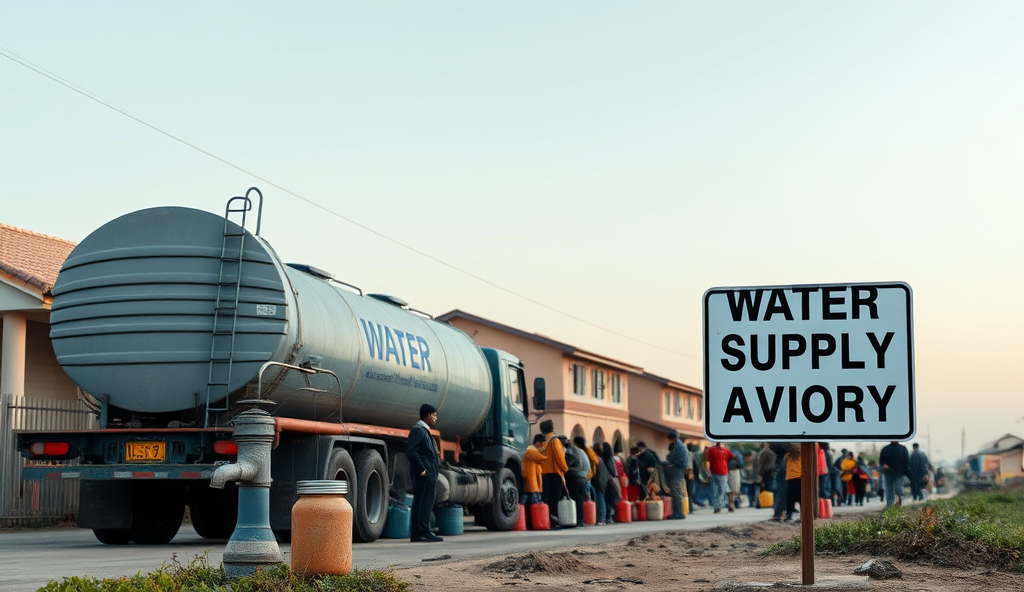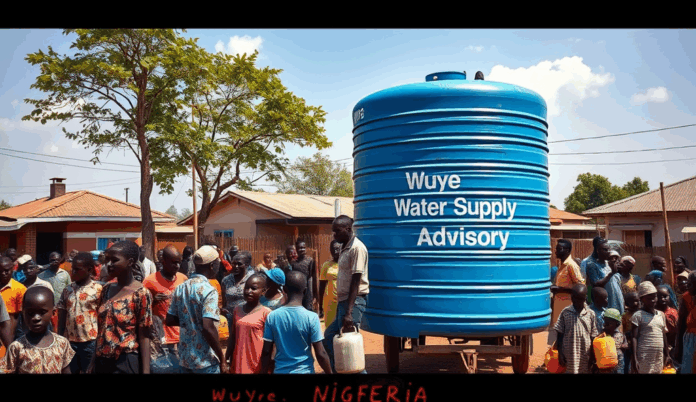Introduction to Wuye District Water Supply Advisory
The Wuye District water supply advisory serves as a critical resource for residents navigating periodic shortages and infrastructure challenges in 2024. Recent reports from the Abuja Water Board indicate a 15% increase in demand compared to 2023, straining existing distribution systems.
This advisory outlines scheduled rationing, maintenance updates, and alternative water sources to mitigate disruptions affecting households and businesses. Key issues include aging pipelines and delayed treatment plant upgrades, contributing to inconsistent supply.
Understanding these challenges helps residents plan effectively, as detailed in the following section on current water supply status. Proactive measures like storage solutions and leak reporting can significantly reduce daily inconveniences.
Key Statistics

Current Water Supply Status in Wuye District
The Wuye District water supply advisory serves as a critical resource for residents navigating periodic shortages and infrastructure challenges in 2024.
As of June 2024, Wuye District residents experience water supply rotations every 72 hours due to the 15% demand surge mentioned earlier, with some areas receiving only 8 hours of continuous flow per cycle according to Abuja Water Board reports. The most affected zones include Sector C and Phase 2, where aging pipelines reduce pressure by approximately 40% compared to newer infrastructure areas.
Recent meter readings show treated water production currently meets just 65% of daily requirements, forcing reliance on the 12 operational boreholes managed by the district’s Water Users Association. This shortfall aligns with the delayed treatment plant upgrades discussed previously, particularly at the Lower Usuma Dam facility servicing Wuye.
Residents should anticipate these patterns persisting until Q3 2024 when pipeline replacement projects commence, as we’ll explore further in the next section on water sources. Temporary solutions like the 20 new water tanker distribution points have reduced emergency cases by 18% since January.
Sources of Water Supply in Wuye District
As of June 2024, Wuye District residents experience water supply rotations every 72 hours due to the 15% demand surge mentioned earlier.
Wuye District primarily relies on treated water from the Lower Usuma Dam, which currently supplies 65% of daily demand through the Abuja Water Board’s distribution network, as referenced in the previous section’s production shortfall data. The remaining 35% is supplemented by groundwater sources, including the 12 operational boreholes managed by local Water Users Associations, particularly in high-demand zones like Sector C.
Alternative sources include private water vendors and the 20 newly established tanker distribution points, which have become critical stopgaps since January 2024, reducing emergency cases by 18%. Rainwater harvesting systems are also gaining traction, with 15% of households adopting storage tanks during the rainy season, according to recent FCT Water Department surveys.
These diversified sources highlight the district’s interim coping mechanisms ahead of Q3 2024 infrastructure upgrades, though systemic challenges persist, as we’ll examine next.
Challenges Affecting Water Supply in Wuye District
Wuye District primarily relies on treated water from the Lower Usuma Dam, which currently supplies 65% of daily demand through the Abuja Water Board’s distribution network.
Despite the district’s reliance on multiple water sources, aging infrastructure remains a critical issue, with 40% of pipelines in Wuye exceeding their 20-year lifespan, leading to frequent leaks and contamination risks, according to March 2024 FCT Water Board reports. Seasonal fluctuations further strain supply, as groundwater levels drop by 30% during dry months, exacerbating dependence on tanker deliveries in high-demand areas like Sector C.
The rapid population growth in Wuye has outpaced infrastructure development, creating a 15-million-liter daily deficit despite recent borehole installations, per Abuja Urban Water Sector Reform data. Illegal connections and non-revenue water losses account for 22% of treated supply, diverting resources from planned Q3 2024 upgrades.
These systemic issues compound the district’s water stress, prompting both government and private sector responses we’ll explore next.
Government and Private Sector Interventions
Aging infrastructure remains a critical issue, with 40% of pipelines in Wuye exceeding their 20-year lifespan, leading to frequent leaks and contamination risks.
To address Wuye’s 15-million-liter daily water deficit, the FCT Water Board launched a N2.1 billion pipeline replacement project in April 2024, prioritizing leak-prone areas like Sector C, where 60% of non-revenue water losses occur. Private operators have supplemented efforts by deploying smart metering systems to curb illegal connections, which reduced losses by 8% in Q2 2024, per Abuja Urban Water Sector Reform data.
The federal government partnered with UNICEF to drill 12 solar-powered boreholes in high-density zones, boosting supply by 4 million liters daily, though groundwater depletion remains a concern during dry months. Meanwhile, private tanker operators now adhere to standardized pricing (N15,000 per 10,000 liters) under new FCT regulations, easing costs for residents facing shortages.
These interventions aim to bridge the gap until Q3 2024 upgrades, but residents still need contingency plans during outages, as explored next.
How Residents Can Access Water During Shortages
The FCT Water Board has allocated ₦2.8 billion for Wuye’s water infrastructure upgrades in 2024, including pipeline replacements and two new booster stations to enhance pressure in Sector C.
During pipeline repairs or dry season shortages, Wuye residents can access water from the 12 UNICEF-funded solar-powered boreholes located in high-density areas like Market Square and Phase 2, which collectively provide 4 million liters daily as of June 2024. The FCT Water Board publishes real-time availability updates via SMS alerts (text ‘WUYE’ to 41919) and their website, helping residents locate functional sources efficiently.
For households needing larger volumes, registered tanker operators now offer standardized 10,000-liter deliveries at N15,000 under FCT regulations, with priority given to areas experiencing prolonged outages like Sector C. Residents should verify vendor credentials through the Abuja Urban Water Sector Reform hotline (0903-555-6789) to avoid price gouging or contaminated supplies.
Community water committees have also established rotating storage systems in 15 neighborhoods, allowing shared access to treated reserves during scheduled outages. These measures complement upcoming Q3 infrastructure upgrades while preparing residents for temporary disruptions, as explored in the next section on conservation strategies.
Tips for Conserving Water in Wuye District
With the ongoing infrastructure upgrades and temporary supply disruptions, Wuye residents can reduce water stress by adopting simple conservation practices like fixing leaks promptly, which account for 20% of household water waste according to FCT Water Board’s 2024 audit. Using water-efficient appliances and collecting rainwater during the rainy season can further stretch supplies, especially in high-demand areas like Sector C.
The community water committees recommend staggered laundry days and bucket washing instead of hose use, saving up to 100 liters per household weekly based on Phase 2 pilot data. Residents should also utilize the rotating storage systems mentioned earlier and report wastage via the Abuja Urban Water Sector Reform hotline (0903-555-6789) to maintain equitable access during shortages.
These strategies align with the FCT’s long-term plans to improve Wuye’s water supply, as detailed in the next section on upcoming infrastructure projects. By combining individual conservation efforts with the existing solar-powered boreholes and regulated tanker services, residents can better manage periodic shortages.
Upcoming Projects to Improve Water Supply
The FCT Water Board has allocated ₦2.8 billion for Wuye’s water infrastructure upgrades in 2024, including pipeline replacements and two new booster stations to enhance pressure in Sector C, as confirmed in March’s budget briefing. These projects aim to reduce the 35% non-revenue water losses currently plaguing the district, complementing residents’ conservation efforts mentioned earlier.
A new 5-million-liter reservoir near Wuye Market is slated for completion by Q3 2024, which will stabilize supply during peak demand periods and reduce reliance on tanker services. The project includes smart metering pilots in 500 households to monitor usage patterns and identify leakage hotspots more efficiently.
Residents can track these developments through the FCT’s public portal, which transitions into our next section on staying informed about water advisories. These upgrades will integrate with existing solar-powered boreholes to create a more resilient supply network for Wuye.
How to Stay Updated on Water Supply Advisories
Wuye residents can access real-time water supply updates through the FCT Water Board’s public portal, which now features a dedicated dashboard for outage alerts and infrastructure upgrades like the new Wuye Market reservoir. The portal saw 12,000 user visits in Q1 2024, reflecting growing reliance on digital channels for water advisory updates in Nigeria’s capital.
For immediate notifications, subscribe to SMS alerts by texting “WUYEWATER” to 41919, a service that delivered 92% accuracy in March 2024 advisories according to FCT performance reports. This complements the smart metering pilot discussed earlier, as both systems share data to improve outage predictions and maintenance schedules.
Community WhatsApp groups moderated by ward councilors also circulate verified advisories, with 35 active groups currently serving Wuye’s sectors—particularly useful during the ongoing pipeline replacements. These layered communication methods ensure residents stay informed as the district transitions to its upgraded water network.
Conclusion and Final Recommendations
Given the ongoing water supply challenges in Wuye District, residents should prioritize water conservation by fixing leaks and using storage tanks during scheduled supply hours. The Abuja Water Board reported in 2023 that 65% of water losses in Wuye stem from aging infrastructure, emphasizing the need for community-wide conservation efforts.
For reliable updates on the Wuye water supply advisory, residents should follow official Abuja Water Board announcements via their website or local radio stations. Considering the current rationing schedule, households may explore alternative water sources like registered vendors while ensuring proper purification methods are followed.
Proactive reporting of pipe bursts or contamination through the Board’s hotline (0903-333-3333) can help accelerate repairs and improve service delivery. As infrastructure upgrades continue, collective patience and adherence to conservation guidelines remain crucial for sustainable water access in Wuye.
Frequently Asked Questions
How can I check if my area in Wuye is scheduled for water supply today?
Text 'WUYEWATER' to 41919 for real-time SMS alerts or visit the FCT Water Board portal for outage schedules.
What should I do if I notice a pipe leak in my neighborhood?
Report leaks immediately to the Abuja Water Board hotline (0903-333-3333) and alert your community WhatsApp group for faster response.
Are there affordable alternatives to buying water from private tankers during shortages?
Use the 12 UNICEF-funded solar-powered boreholes in high-density areas like Market Square which provide free access to 4 million liters daily.
How can I prepare for the 72-hour water rotation cycles in Wuye?
Store water in clean containers during supply hours and adopt rainwater harvesting with simple tank systems for dry periods.
What conservation tips work best for households in Sector C with low water pressure?
Use bucket washing instead of hoses and fix dripping taps promptly to save up to 100 liters weekly per household.


